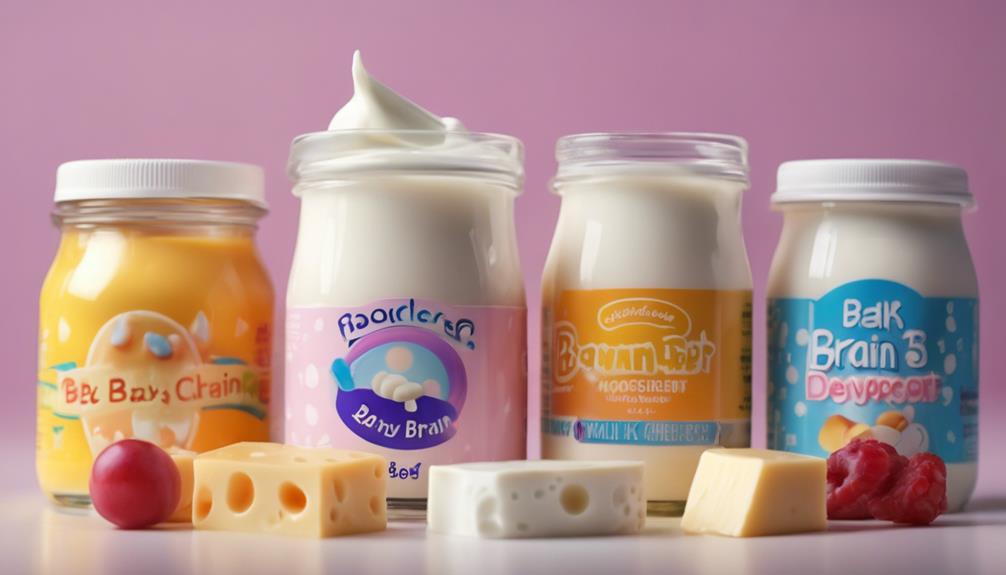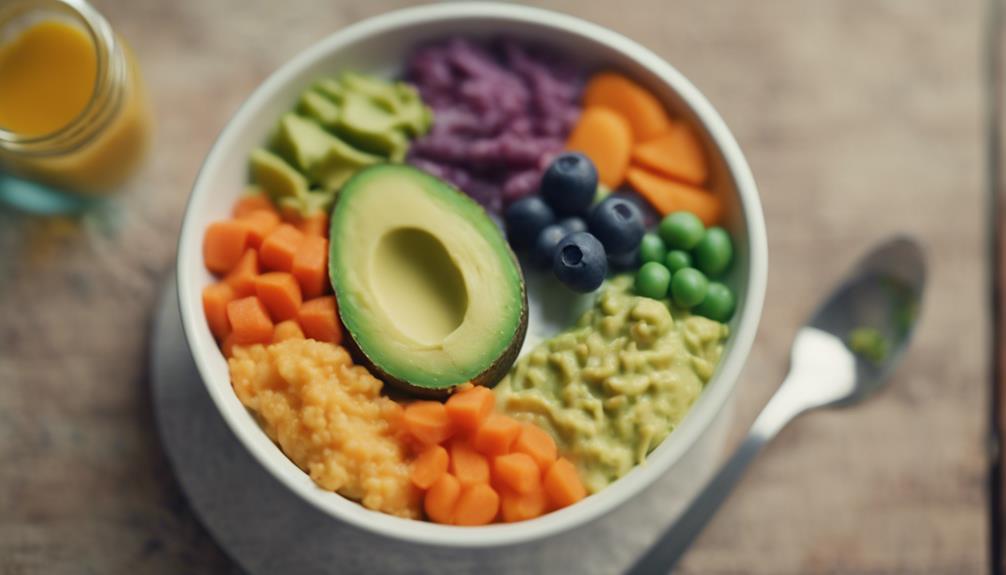To ensure your baby’s brain development, focus on essential proteins like lean meat, poultry, fish, beans, and dairy. These foods offer important nutrients for brain growth and cognitive function, supporting the formation of brain cells and neurotransmitters. Including zinc-rich foods like oysters, red meat, poultry, beans, and nuts can help enhance cognitive abilities. Iron sources such as lean beef, black beans, and spinach aid in the transportation of oxygen to the brain. Choline-rich foods like eggs and dairy are crucial for brain cell development. Remember, a variety of nutrient-rich foods is key for optimal brain growth. Expand your understanding of baby brain development by exploring additional nutrient-rich options.
Key Takeaways
- Include lean meat, fish, beans, and dairy for brain growth.
- Zinc-rich foods like oysters and nuts aid cognitive function.
- Iron sources like black beans and spinach support brain oxygen transport.
- Choline-rich foods such as eggs are crucial for brain cell development.
- Folate-rich foods like lentils and spinach are vital for neural tube development.
Essential Proteins for Brain Growth
To support your baby's brain growth, include essential proteins from sources like lean meat, poultry, fish, beans, and dairy in their diet. These proteins are rich in essential nutrients that are important for brain development and cognitive function.
When you feed your baby a variety of protein-rich foods, you provide the amino acids necessary for building brain cells and neurotransmitters. Iron and zinc found in these proteins play significant roles in memory, concentration, and overall brain function.
Ensuring that your baby receives adequate protein intake from diverse sources is key to promoting ideal brain growth and cognitive development. By incorporating lean meats, poultry, fish, beans, and dairy into their meals, you're giving them the building blocks needed for a healthy brain.
Zinc-Rich Foods for Cognitive Function

Include foods rich in zinc like oysters, red meat, poultry, beans, and nuts to support cognitive function in your baby. Zinc is essential for cognitive function in infants, aiding in memory, concentration, and learning abilities. Zinc-rich foods such as dairy, whole grains, and fortified cereals are vital for healthy brain development. A balanced diet with these foods is key to ideal brain development in babies and toddlers. Here is a table highlighting some zinc-rich foods that you can incorporate into your baby's diet:
| Food | Zinc Content (per 100g) | Benefits |
|---|---|---|
| Oysters | 78.6mg | Enhances memory |
| Red Meat | 5.2mg | Supports concentration |
| Poultry | 2.7mg | Aids in learning abilities |
| Beans | 1.0mg | Essential for brain health |
| Nuts | 3.1mg | Supports overall cognitive function |
Iron Sources for Brain Oxygen Transport

Iron sources play an important role in brain oxygen transport, ensuring the supply of essential nutrients for red blood cell production. When it comes to supporting your brain's oxygen needs, incorporating iron-rich foods into your diet is essential. Here are some fantastic options to boost your iron intake:
- Lean Beef: Packed with iron and memory-boosting zinc, lean beef is a top choice for promoting brain oxygen transport.
- Black Beans: These legumes are an excellent plant-based source of iron, important for red blood cell production and overall brain function.
- Spinach: Rich in iron and other nutrients, spinach aids in oxygen transport and energy production in the brain.
- Soy Burgers: Vegetarian-friendly soy burgers provide non-heme iron, supporting brain health and oxygen delivery.
- Tomatoes and Strawberries: Pairing iron-rich foods with vitamin C sources like tomatoes and strawberries can enhance iron absorption, ensuring essential brain oxygen transport.
Choline-Rich Foods for Brain Cells

Choline-rich foods are like superheroes for your baby's brain cells, helping them develop and function at their best. Eggs, dairy, and meat are all packed with this essential nutrient that plays an important role in memory and neurotransmitter production.
Make sure to include these choline-rich foods in your little one's diet to give their brain the support it needs to thrive.
Choline Boosts Brain Cells
Boost your brain cells with the essential nutrient choline found in foods like eggs, liver, dairy products, and cruciferous vegetables. Choline is important for brain cell development and function, impacting memory and the production of acetylcholine, a key neurotransmitter facilitating brain communication.
Here are some reasons why choline-rich foods are beneficial for your brain:
- Brain Cell Development: Choline supports the growth and maintenance of healthy brain cells.
- Memory Enhancement: Adequate choline intake can improve memory and cognitive function.
- Acetylcholine Production: Choline is essential for synthesizing acetylcholine, aiding in nerve signaling.
- Brain Health: Including choline in your diet promotes overall brain health and function.
- Pregnancy Support: Pregnant women benefit from choline for optimal brain development in their babies.
Essential Nutrient for Development
Including choline-rich foods in your diet is vital for supporting healthy brain cell development, especially in babies and young children. Choline plays an essential role in brain function, aiding in memory and neurotransmitter production. Foods like eggs, dairy, and meat are excellent sources of choline, making them beneficial for infants and toddlers' brain development.
Among these, eggs stand out as a top recommendation due to their high choline content. When preparing choline-rich foods, it's important to take into account cooking methods, as choline is sensitive to water and heat. Opt for fully cooked eggs to maximize the benefits of this essential nutrient for brain cell development.
Vital Folate for Neural Tube Development

Folate is vital for the healthy development of your baby's neural tube, which forms the brain and spinal cord.
Ensuring you consume enough folate can greatly reduce the risk of neural tube defects such as spina bifida.
Include folate-rich foods like liver, lentils, spinach, asparagus, and fortified cereals in your diet to support your baby's brain health during pregnancy.
Folate and Brain Health
Sufficient intake of folate is essential for the healthy development of your baby's neural tube during early pregnancy. Folate, found abundantly in leafy greens, is a vital nutrient for brain development.
Here are some key points to keep in mind about folate and brain health:
- Adequate folate intake reduces the risk of neural tube defects like spina bifida.
- Foods rich in folate include leafy greens, citrus fruits, beans, and fortified grains.
- Pregnant women are advised to consume 400-800 micrograms of folate daily.
- Folate plays a critical role in DNA synthesis and cell growth, essential for baby's brain development.
- Including folate-rich foods in your diet can support your baby's neural tube development and overall brain health, ensuring a strong foundation for their future cognitive abilities.
Importance of Folate
During the critical first trimester of pregnancy, ensuring an adequate intake of folate is essential for supporting the healthy development of your baby's neural tube. Folate, also known as folic acid, plays a pivotal role in the formation of the neural tube, which later develops into the baby's brain and spinal cord. Adequate folate levels greatly reduce the risk of neural tube defects such as spina bifida and anencephaly.
To make sure you're getting enough folate, it's recommended that pregnant women take a folic acid supplement in addition to consuming folate-rich foods. Folate can be found in foods like liver, spinach, fortified cereals, and bread.
These nutrients are essential for DNA synthesis and repair, critical processes for the healthy development of your baby's brain and spinal cord.
Folate-Rich Foods
An essential component for supporting neural tube development in babies is found abundantly in foods like liver, spinach, fortified cereals, and bread. Folate-rich foods play a crucial role in ensuring proper baby brain development, reducing the risk of neural tube defects in newborns.
Here are some key points to keep in mind:
- Crucial Nutrient: Folate supports brain and spinal cord development during early pregnancy stages.
- Risk Reduction: Adequate folate intake during pregnancy lowers the likelihood of neural tube defects in infants.
- Cognitive Benefits: Low folate levels may contribute to cognitive impairments and developmental delays in babies.
- Dietary Importance: Including folate-rich foods in the maternal diet is essential for promoting healthy baby brain development.
- Long-Term Impact: The benefits of consuming folate-rich foods extend beyond infancy, supporting overall cognitive function throughout a child's life.
Nutrient-Rich Lean Meats

Incorporating nutrient-rich lean meats into your child's diet regularly can greatly contribute to their brain development and cognitive function. Lean meats are packed with essential nutrients like iron and zinc, important for memory and overall brain function.
Zinc deficiency has been associated with memory problems, underscoring the significance of including lean meats in your child's meals. Iron from lean meats plays a critical role in supplying oxygen to the brain, helping prevent cognitive issues linked to iron deficiency.
What's great is that cooking lean meats doesn't lead to mineral loss, ensuring your child gets the maximum benefit for their brain health. By incorporating lean meats into your child's diet, you're supporting healthy brain development and optimal cognitive function.
Brain-Boosting Dairy Products

Lean meats aren't the only foods that can support your child's brain development; Brain-boosting dairy products also play an important role in providing essential nutrients for cognitive function and overall brain health.
Dairy products like milk and yogurt are packed with protein, B-vitamins, calcium, and vitamin D, important for brain tissue growth and neurotransmitter function.
Here are some key points to keep in mind when including dairy in your baby's diet:
- Essential Nutrients: Dairy provides essential nutrients like protein, B-vitamins, calcium, and vitamin D necessary for brain development.
- Vitamin D Benefits: Vitamin D in dairy products supports the neuromuscular system and cell cycle, promoting overall brain health.
- Protein for Brain Growth: The protein content in dairy aids in brain tissue growth and neurotransmitter function in infants.
- Variety of Dairy Sources: Milk, yogurt, and cheese sticks are excellent options to incorporate dairy into your baby's diet.
- Cognitive Development: Including dairy products can contribute significantly to your baby's cognitive function and overall brain development.
Brain-Healthy Dark Leafy Greens

Dark leafy greens such as spinach and kale offer essential nutrients that support healthy brain development in babies. These veggies aren't just your average greens; they're packed with antioxidants that shield brain cells from harm by free radicals.
Vitamin K found abundantly in dark leafy greens plays an important role in forming sphingolipids, a type of fat essential for brain cell membranes. Spinach, a folate-rich source, provides B-vitamins that aid cognitive function and brain growth in infants.
On the other hand, kale boasts high levels of lutein, a component associated with enhanced cognitive abilities and memory in babies. By incorporating dark leafy greens into your baby's meals, you can help foster healthy brain development and overall cognitive function.
Brain-Enhancing Fortified Cereals

Enhance your baby's brain development with fortified cereals enriched with essential nutrients like iron, zinc, and B vitamins. These cereals play a crucial role in supporting your little one's cognitive growth and overall brain health.
Here's why they're beneficial:
- Iron-Fortified Cereals: Help prevent iron deficiency anemia, a common issue in infancy that can affect brain function.
- Zinc: Found in fortified cereals, supports memory and cognitive development in babies.
- B Vitamins: Aid in nerve function and contribute to overall brain health for growing infants.
- Whole Grain Options: Choosing whole grain fortified cereals with added nutrients offers a convenient and nutritious way to promote baby brain development.
- Nutrient Enrichment: The added nutrients in fortified cereals provide essential building blocks for your baby's developing brain.
Frequently Asked Questions
What Are the Top 5 Brain Foods?
You should focus on the top 5 brain foods for best development. Foods like salmon, eggs, lean meat, dairy, nuts, and seeds provide essential nutrients important for brain growth in babies.
What Foods Help Brain Development?
To support brain development, include salmon, eggs, lean meats, dairy, and colorful fruits/veggies in your baby's diet. These foods offer essential nutrients like Omega-3, choline, zinc, iron, and antioxidants, important for cognitive growth.
What Stimulates Baby's Brain Development?
To stimulate your baby's brain development, engage in sensory experiences like textures, sounds, and colors. Talk, sing, and play together to strengthen neural connections. Encourage movement, exploration, and play for motor skills and cognitive growth.
How Can I Speed up My Baby's Brain Development?
You can speed up your baby's brain development by providing a variety of nutrient-rich foods. Include colorful fruits, veggies, lean proteins, and whole grains in their diet. A balanced, brain-boosting menu lays the foundation for a bright future.
Conclusion
Feed your little one's brain with the right nutrients to help them thrive and grow.
Just like a gardener tends to their plants with care, you can nourish your baby's brain with these top foods for peak development.
Remember, a well-fed brain is like a well-oiled machine, ready to take on the world with curiosity and intelligence.
So, stock up on these brain-boosting foods and watch your baby's mind bloom!










